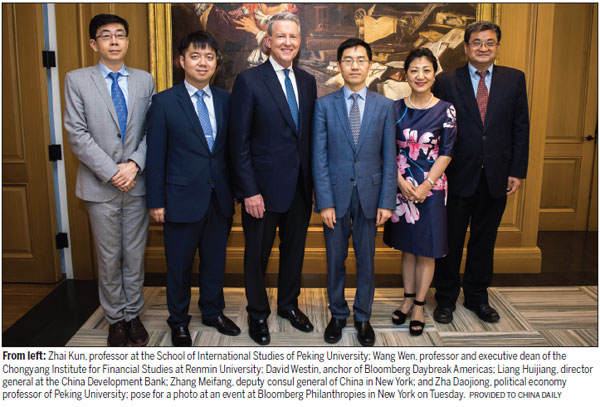Helping on Belt and Road

Chinese financial experts see room for US to get involved, including media
The US can play a more constructive role on the Belt and Road Initiative (BRI), according to a group of Chinese financial experts visiting New York.
"No matter how you see it, the United States is a part of the BRI because the whole idea is about global growth and development," Zha Daojiong, international political economy professor of Peking University, said at a luncheon event with Bloomberg business journalists and other mainstream media representatives at Bloomberg Philanthropies in New York on Tuesday.
Zha was among a delegation of five Chinese financial and economic scholars in New York to discuss the latest on the BRI.
The delegation also spoke at a forum held by the National Committee on US- China Relations and the India China Institute at the New School on Tuesday night.
Zha said the US could help China by being a part of BRI financing. "We need good risk assessment; we need the private sectors to work with us," he said.
Zha said that one of the ideas in the financing of BRI is public-private partnership (PPP) and China will spread PPP in countries participating in BRI.
The PPP would help facilitate projects as it broadens financing channels for companies.
"But it needs to be handled with a lot of foresight and experience, otherwise PPP can become promise, postpone and paralysis, and that's not what you want to see," Zha joked.
"We wanted the US, which is a very important member in major international financial decisions, like (through the) World Bank and Asian Development Bank to continually work with us, (since) we have made some good progress," Zha said.
Zha said that of AIIB projects in the past few years, "even with a short history, it made a right beginning in terms of partnering with World Bank and others to make these loans and gained experiences".
Wang Wen, executive dean of the Chongyang Institute for Financial Studies at Renmin University of China, said to keep its role as the world's capital, New York needs to find the next wave of opportunities, which in his opinion could be the BRI.
Zhai Kun, professor at the School of International Studies of Peking University, said BRI's prospects are bright. However, US President Donald Trump's policy toward Asia and Asia Pacific is uncertain.
The scholars also called for Western mainstream media to provide more news coverage of BRI.
Wang said the inference he draws is that many Western media exaggerate China's global ambition based on BRI. And on the other hand, they underestimate the potential for cooperation between China and the US.
"China is not a revolutionary state of the global order, and China is one of the most important states for supporting the global order that the US established at the end of the World War II," Wang said.
"China and the US have so many fields for cooperating, such as infrastructure," Wang said.
























